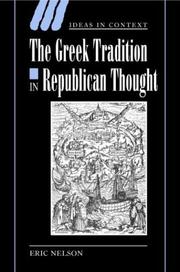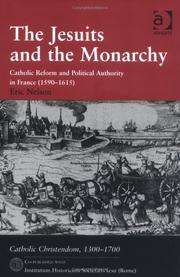| Listing 1 - 10 of 45 | << page >> |
Sort by
|
Book
ISBN: 9780674050587 Year: 2010 Publisher: Cambridge Harvard University Press
Abstract | Keywords | Export | Availability | Bookmark
 Loading...
Loading...Choose an application
- Reference Manager
- EndNote
- RefWorks (Direct export to RefWorks)
History of Europe --- Political philosophy. Social philosophy --- Political systems --- anno 1600-1699 --- anno 1500-1599 --- Jews --- Judaism and politics --- Political science --- Politics in rabbinical literature. --- Politics and government --- History of doctrines. --- History. --- Europe --- Civilization --- Jewish influences.

ISBN: 0521835453 051118798X 9780511187988 9780521835459 0511185294 9780511185298 051118705X 9780511187056 0511186126 9780511186127 0521024285 1107149827 9781107149823 1280458089 9781280458088 0511327080 9780511327087 9780511490644 051149064X 9780521024280 0521024285 Year: 2004 Volume: 69 Publisher: Cambridge, UK ; New York : Cambridge University Press,
Abstract | Keywords | Export | Availability | Bookmark
 Loading...
Loading...Choose an application
- Reference Manager
- EndNote
- RefWorks (Direct export to RefWorks)
The Greek Tradition in Republic Thought completely rewrites the standard history of republican political theory. It excavates an identifiably Greek strain of republican thought which attaches little importance to freedom as non-dependence and sees no intrinsic value in political participation. This tradition's central preoccupations are not honour and glory, but happiness (eudaimonia) and justice - defined, in Plato's terms, as the rule of the best men. This set of commitments yields as startling readiness to advocate the corrective redistribution of wealth, and even the outright abolition of private property. The Greek tradition was revived in England during the early sixteenth century and was broadly influential throughout the seventeenth and eighteenth centuries. Its exponents included Sir Thomas More, James Harrington, Montesquieu and Thomas Jefferson, and it contributed significantly to the ideological underpinnings of the American Founding as well as the English Civil Wars.
Republicanism --- Republikanisme --- Republikeinse gezindheid --- Républicanisme --- Greece --- Political science --- Republicanism. --- Arts and Humanities --- History --- Republicanism - Greece

ISBN: 075463888X 8870413586 9780754638889 9781315238838 9781351887229 9788870413588 Year: 2005 Volume: 58 Publisher: Roma ; Aldershot-Burlington Institutum Historicum Societatis Iesu ; Ashgate
Abstract | Keywords | Export | Availability | Bookmark
 Loading...
Loading...Choose an application
- Reference Manager
- EndNote
- RefWorks (Direct export to RefWorks)
271.53 --- Religion Jesuits History --- Church and state --- Monarchy --- #GBIB: jesuitica --- 271.5 <44> --- 271.5 <44> Jezuïeten--Frankrijk --- Jezuïeten--Frankrijk --- Kingdom (Monarchy) --- Executive power --- Political science --- Royalists --- Christianity and state --- Separation of church and state --- State and church --- State, The --- History --- Jesuits --- Compagnie de Jésus --- Compañia de Jesus --- Gesellschaft Jesu --- Jesuitas --- Jesuiten --- Jesuiti --- Jezuïten --- Jésuites --- Paters Jezuïten --- Societeit van Jezus --- Society of Jesus --- France --- Politics and government --- History of France --- Christian religious orders --- anno 1600-1699 --- anno 1500-1599 --- Societas Jesu --- Monarchie --- Eglise et Etat --- Histoire --- Politique et gouvernement --- 16th century --- 17th century --- イエズス会 --- カトリック イエズス会
Book
ISBN: 0674056744 9780674056749 9780674050587 0674050584 9780674062139 0674062132 Year: 2010 Publisher: Cambridge, Mass. : Harvard University Press,
Abstract | Keywords | Export | Availability | Bookmark
 Loading...
Loading...Choose an application
- Reference Manager
- EndNote
- RefWorks (Direct export to RefWorks)
According to a commonplace narrative, the rise of modern political thought in the West resulted from secularization-the exclusion of religious arguments from political discourse. But in this pathbreaking work Eric Nelson argues that this familiar story is wrong. Instead, he contends, political thought in early-modern Europe became less, not more, secular with time, and it was the Christian encounter with Hebrew sources that provoked this radical transformation. During the sixteenth and seventeenth centuries, Christian scholars began to regard the Hebrew Bible as a political constitution designed by God for the children of Israel. Newly available rabbinic materials became authoritative guides to the institutions and practices of the perfect republic. This thinking resulted in a sweeping reorientation of political commitments. In the book's central chapters Nelson identifies three transformative claims introduced into European political theory by the Hebrew revival: the argument that republics are the only legitimate regimes; the idea that the state should coercively maintain an egalitarian distribution of property; and the belief that a godly republic would tolerate religious diversity. One major consequence of Nelson's work is that the revolutionary politics of John Milton, James Harrington, and Thomas Hobbes appear in a brand-new light. Nelson demonstrates that central features of modern political thought emerged from an attempt to emulate a constitution designed by God. This paradox, a reminder that while we may live in a secular age, we owe our politics to an age of religious fervor, in turn illuminates fault lines in contemporary political discourse.
Jews --- Judaism and politics --- Politics in rabbinical literature. --- Political science --- Political science in rabbinical literature --- Rabbinical literature --- Judaism --- Politics and Judaism --- Politics and government --- History of doctrines. --- History. --- Political aspects --- Europe --- Civilization --- Jewish influences.
Book
ISBN: 0674744632 0674736036 9780674736030 9780674735347 067473534X 067497977X Year: 2014 Publisher: Cambridge, MA : Harvard University Press,
Abstract | Keywords | Export | Availability | Bookmark
 Loading...
Loading...Choose an application
- Reference Manager
- EndNote
- RefWorks (Direct export to RefWorks)
Generations of students have been taught that the American Revolution was a revolt against royal tyranny. In this revisionist account, Eric Nelson argues that a great many of our “founding fathers” saw themselves as rebels against the British Parliament, not the Crown. The Royalist Revolution interprets the patriot campaign of the 1770s as an insurrection in favor of royal power—driven by the conviction that the Lords and Commons had usurped the just prerogatives of the monarch. Leading patriots believed that the colonies were the king’s own to govern, and they urged George III to defy Parliament and rule directly. These theorists were proposing to turn back the clock on the English constitution, rejecting the Whig settlement that had secured the supremacy of Parliament after the Glorious Revolution. Instead, they embraced the political theory of those who had waged the last great campaign against Parliament’s “usurpations”: the reviled Stuart monarchs of the seventeenth century. When it came time to design the state and federal constitutions, the very same figures who had defended this expansive conception of royal authority—John Adams, Alexander Hamilton, James Wilson, and their allies—returned to the fray as champions of a single executive vested with sweeping prerogatives. As a result of their labors, the Constitution of 1787 would assign its new president far more power than any British monarch had wielded for almost a hundred years. On one side of the Atlantic, Nelson concludes, there would be kings without monarchy; on the other, monarchy without kings.
Political science --- Constitutional history --- Monarchy. --- Kingdom (Monarchy) --- Executive power --- Royalists --- Constitutional history, Modern --- Constitutional law --- Constitutions --- History --- United States --- ABŞ --- ABSh --- Ameerika Ühendriigid --- America (Republic) --- Amerika Birlăshmish Shtatlary --- Amerika Birlăşmi Ştatları --- Amerika Birlăşmiş Ştatları --- Amerika ka Kelenyalen Jamanaw --- Amerika Qūrama Shtattary --- Amerika Qŭshma Shtatlari --- Amerika Qushma Shtattary --- Amerika (Republic) --- Amerikai Egyesült Államok --- Amerikanʹ Veĭtʹsėndi︠a︡vks Shtattnė --- Amerikări Pĕrleshu̇llĕ Shtatsem --- Amerikas Forenede Stater --- Amerikayi Miatsʻyal Nahangner --- Ameriketako Estatu Batuak --- Amirika Carékat --- AQSh --- Ar. ha-B. --- Arhab --- Artsot ha-Berit --- Artzois Ha'bris --- Bí-kok --- Ē.P.A. --- EE.UU. --- Egyesült Államok --- ĒPA --- Estados Unidos --- Estados Unidos da América do Norte --- Estados Unidos de América --- Estaos Xuníos --- Estaos Xuníos d'América --- Estatos Unitos --- Estatos Unitos d'America --- Estats Units d'Amèrica --- Ètats-Unis d'Amèrica --- États-Unis d'Amérique --- Fareyniḳṭe Shṭaṭn --- Feriene Steaten --- Feriene Steaten fan Amearika --- Forente stater --- FS --- Hēnomenai Politeiai Amerikēs --- Hēnōmenes Politeies tēs Amerikēs --- Hiwsisayin Amerikayi Miatsʻeal Tērutʻiwnkʻ --- Istadus Unidus --- Jungtinės Amerikos valstybės --- Mei guo --- Mei-kuo --- Meiguo --- Mî-koet --- Miatsʻyal Nahangner --- Miguk --- Na Stàitean Aonaichte --- NSA --- S.U.A. --- SAD --- Saharat ʻAmērikā --- SASht --- Severo-Amerikanskie Shtaty --- Severo-Amerikanskie Soedinennye Shtaty --- Si︠e︡vero-Amerikanskīe Soedinennye Shtaty --- Sjedinjene Američke Države --- Soedinennye Shtaty Ameriki --- Soedinennye Shtaty Severnoĭ Ameriki --- Soedinennye Shtaty Si︠e︡vernoĭ Ameriki --- Spojené staty americké --- SShA --- Stadoù-Unanet Amerika --- Stáit Aontaithe Mheiriceá --- Stany Zjednoczone --- Stati Uniti --- Stati Uniti d'America --- Stâts Unîts --- Stâts Unîts di Americhe --- Steatyn Unnaneysit --- Steatyn Unnaneysit America --- SUA (Stati Uniti d'America) --- Sŭedineni amerikanski shtati --- Sŭedinenite shtati --- Tetã peteĩ reko Amérikagua --- U.S. --- U.S.A. --- United States of America --- Unol Daleithiau --- Unol Daleithiau America --- Unuiĝintaj Ŝtatoj de Ameriko --- US --- USA --- Usono --- Vaeinigte Staatn --- Vaeinigte Staatn vo Amerika --- Vereinigte Staaten --- Vereinigte Staaten von Amerika --- Verenigde State van Amerika --- Verenigde Staten --- VS --- VSA --- Wááshindoon Bikéyah Ałhidadiidzooígíí --- Wilāyāt al-Muttaḥidah --- Wilāyāt al-Muttaḥidah al-Amirīkīyah --- Wilāyāt al-Muttaḥidah al-Amrīkīyah --- Yhdysvallat --- Yunaeted Stet --- Yunaeted Stet blong Amerika --- ZDA --- Združene države Amerike --- Zʹi︠e︡dnani Derz︠h︡avy Ameryky --- Zjadnośone staty Ameriki --- Zluchanyi︠a︡ Shtaty Ameryki --- Zlucheni Derz︠h︡avy --- ZSA --- Η.Π.Α. --- Ηνωμένες Πολιτείες της Αμερικής --- Америка (Republic) --- Американь Вейтьсэндявкс Штаттнэ --- Америкӑри Пӗрлешӳллӗ Штатсем --- САЩ --- Съединените щати --- Злучаныя Штаты Амерыкі --- ولايات المتحدة --- ولايات المتّحدة الأمريكيّة --- ولايات المتحدة الامريكية --- 미국 --- Politics and government --- Spojené obce severoamerické --- 18th century --- Monarchy --- États-Unis --- É.-U. --- ÉU
Book
ISBN: 9780674240940 0674240944 0674242947 0674242955 Year: 2019 Publisher: Cambridge, MA : Harvard University Press,
Abstract | Keywords | Export | Availability | Bookmark
 Loading...
Loading...Choose an application
- Reference Manager
- EndNote
- RefWorks (Direct export to RefWorks)
Modern liberal political philosophy is closely associated with post-1945 secularism. But Eric Nelson contends that the liberal tradition founded by John Rawls is an unwitting outgrowth of ancient theological debates about justice and evil. When we understand this, we can better untangle the knotted strands of liberal political thought.
Political philosophy. Social philosophy --- Religious studies --- Liberalism --- Religion and politics --- Pelagianism --- Liberalism. --- Religion and politics. --- Pelagianism. --- Religious aspects --- Christianity.
Book
ISBN: 0191733970 0199541000 Year: 2008 Publisher: Oxford University Press
Abstract | Keywords | Export | Availability | Bookmark
 Loading...
Loading...Choose an application
- Reference Manager
- EndNote
- RefWorks (Direct export to RefWorks)
Book
ISBN: 0674242955 0674242947 Year: 2019 Publisher: Cambridge, MA : Harvard University Press,
Abstract | Keywords | Export | Availability | Bookmark
 Loading...
Loading...Choose an application
- Reference Manager
- EndNote
- RefWorks (Direct export to RefWorks)
Modern liberal political philosophy is closely associated with post-1945 secularism. But Eric Nelson contends that the liberal tradition founded by John Rawls is an unwitting outgrowth of ancient theological debates about justice and evil. When we understand this, we can better untangle the knotted strands of liberal political thought.
Liberalism --- Liberalism. --- Religion and politics. --- Pelagianism. --- Religious aspects --- Christianity.
Book
ISBN: 9780674242944 Year: 2019 Publisher: Cambridge, MA
Abstract | Keywords | Export | Availability | Bookmark
 Loading...
Loading...Choose an application
- Reference Manager
- EndNote
- RefWorks (Direct export to RefWorks)
Digital
ISBN: 9780674056749 9780674050587 Year: 2011 Publisher: Cambridge, Mass. Harvard University Press
Abstract | Keywords | Export | Availability | Bookmark
 Loading...
Loading...Choose an application
- Reference Manager
- EndNote
- RefWorks (Direct export to RefWorks)
| Listing 1 - 10 of 45 | << page >> |
Sort by
|

 Search
Search Feedback
Feedback About UniCat
About UniCat  Help
Help News
News